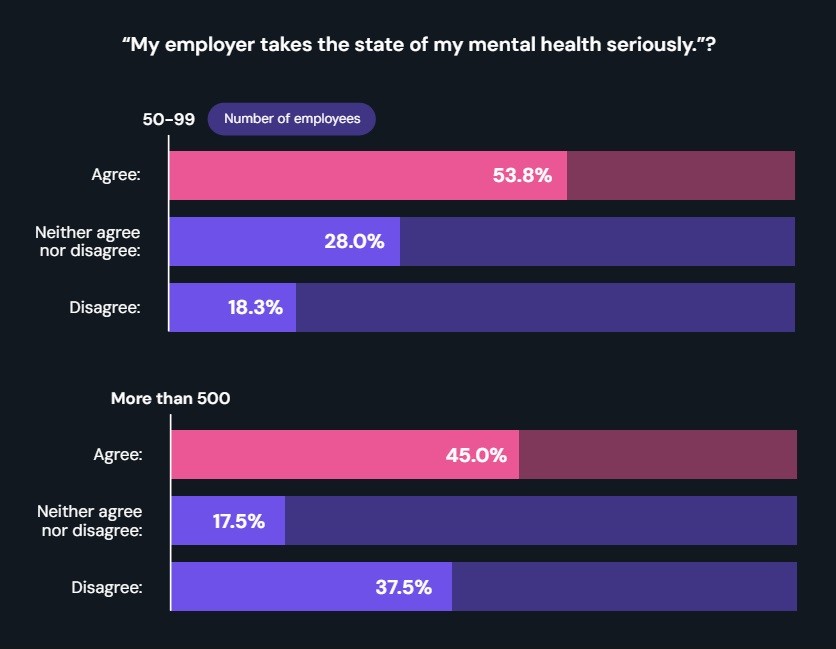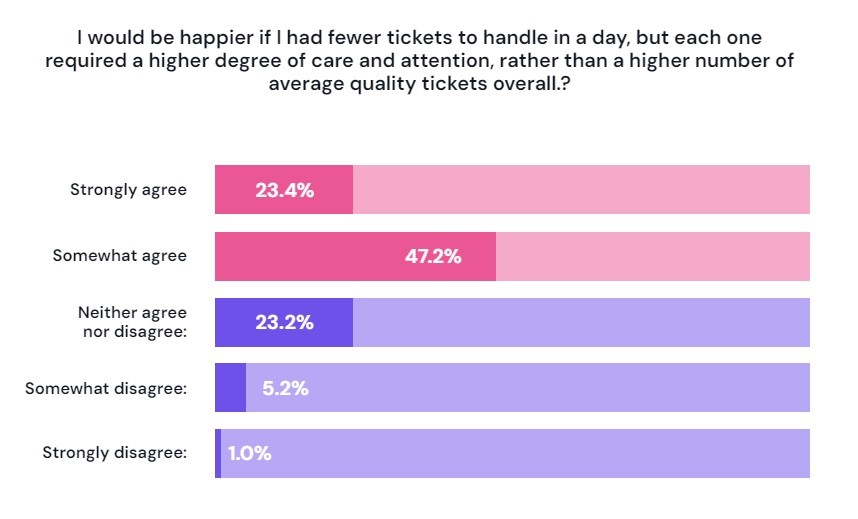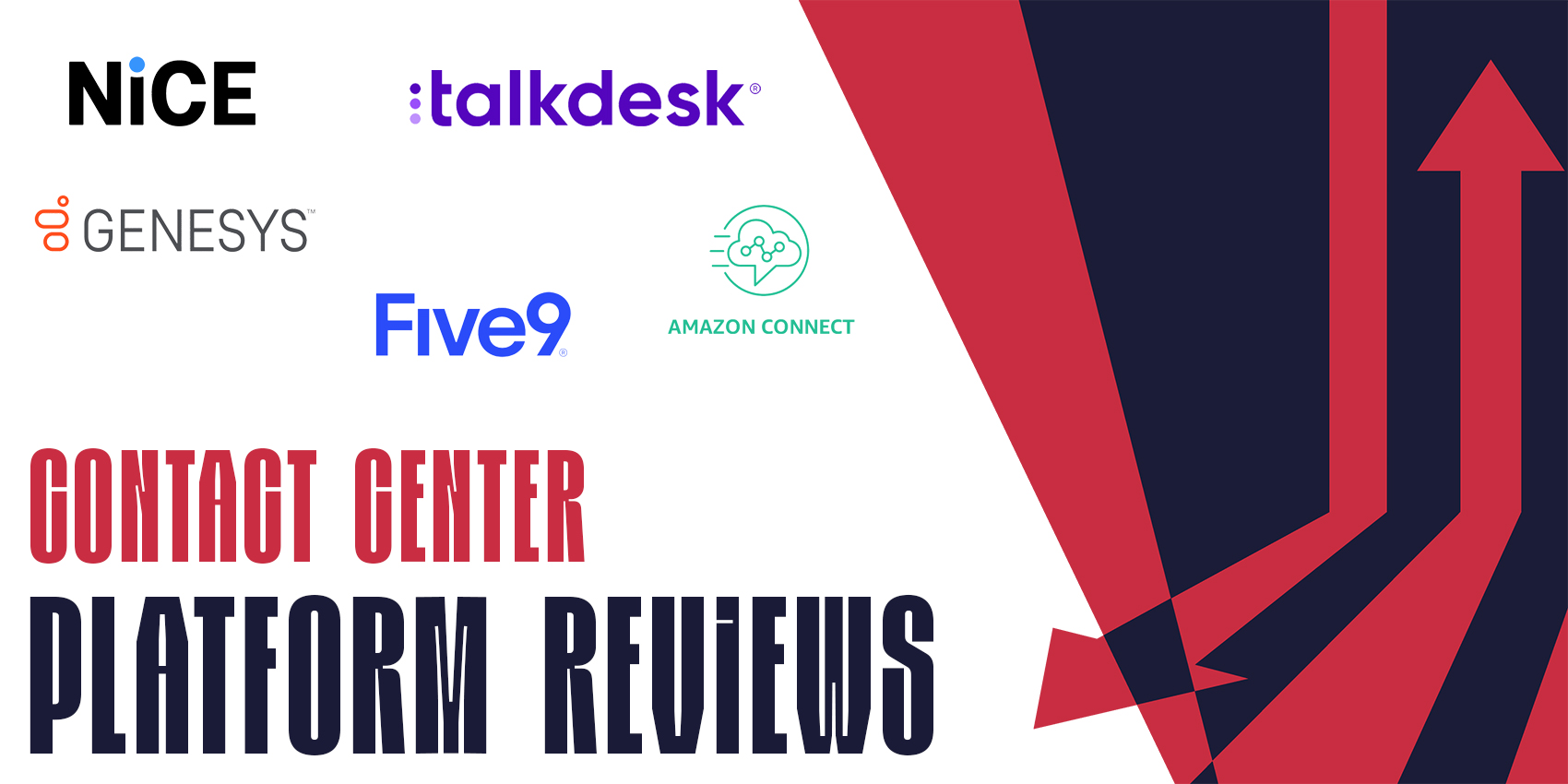A survey of retail customer service agents has revealed that over half do not believe that their employers take their mental health seriously.
Conducted by DigitalGenius in support of Mental Health Awareness Week, the report explored how working at the frontline of customer service impacts agents’ mental health, and what measures and support employers are, or should be, implementing.
Of the 517 agents surveyed, only 48% believe that their organization takes their mental health seriously. Interestingly, the findings revealed that the larger the company, the less supported agents feel – as highlighted in the below graphs:

customer service agents
This is particularly troubling when coupled with the fact that 83% of call center agents have reported that work pressures have directly impacted their mental health, with 95% admitting that work-related mental wellbeing concerns have lowered their productivity.
The latter point here is especially important for employers, as while many may not consider it their responsibility to have a moral or ethical interest in their employees, the research shows that providing mental health support and fostering a happy environment is actually a savvy business decision.
Eleanor Galtie, Customer Service Manager at Boardriders, discusses her own teams’ experiences and how having happy agents is crucial to the success of the business:
It [employee wellbeing] is directly connected to employee satisfaction and engagement, increased productivity and a reduction in absenteeism. This is especially crucial for my team, given the potentially stressful nature of their role especially during peak periods.
Moreover, research conducted by digital job search and review platform Glassdoor, found a correlation between reported employee well-being and customer satisfaction – implying that happier employees equal happier customers.
So, let’s take a look at some of the causes of added stress that are negatively impacting agents’ wellbeing.
Stopping the Stressors
While any job can come with stresses, the report focuses its attention on issues and scenarios specific to the customer service sector, such as wait times, ticket numbers, and peak periods.
Unsurprisingly, it is the former of the above three areas that proved to be a significant factor in damaging an agent’s mental health.
Of those surveyed, 69% (17% strongly, 52% somewhat) agreed that dealing with customers who had experienced long wait times made their work more difficult, less enjoyable, and adversely affected their mental wellbeing.
Working during peak periods was another clearly defined stressor, which links to and enhances the issue of long wait times. Not only are periods such as Christmas a lot busier so likely to result in longer customer queues, but they can also be a highly stressful time for the customer – making it a perfect storm of unhappiness that agents must try to deal with.
Indeed, the report revealed that 73% of respondents felt more stressed and overwhelmed during peak trading periods.
Another key finding from the report was how tickets impacted agents’ mood and performance. While those surveyed did outline customer case handling targets as stress contributors, arguably the more interesting finding concerned the types of customer tickets that agents would prefer.
Although some agents admitted to wanting to get a few easier tickets under their belt early in the day to help with targets, the majority showed a preference for handling more complex cases.
As outlined in the graph below, almost three-quarters of respondents favored working on more complicated and challenging cases – providing the ticket target reflected this.

customer service agents
So, what exactly are companies doing to prevent these stressors and support their employees – and perhaps more importantly, what aren’t they doing?
Supporting Your Employees
As is often the case, identifying the issues is the easy part, resolving the issues can be much more difficult.
Despite the wider awareness surrounding employee wellbeing and mental health in modern society, 46% of those surveyed revealed that their employer does not offer any tools or support to help alleviate stress and protect agents’ mental health struggles.
Unfortunately, even for those companies that do provide initiatives, there appears to be a disconnect between what employees need and what employers are prioritizing.
Respondents were asked to list the actions they wanted their employer to take and the actions they were actually taking, and while initiatives like dedicated mental health days, someone to talk to, and more breaks appeared on both lists, the top performers were markedly different.
The most common resource provided by employers is access to mental health apps (16%), yet this did not appear at all on the list of priorities for employees, who instead consistently used words like “listening”, “awareness”, and “acknowledgement.”
The survey findings suggest that many companies appear to be hiding behind quick-fix solutions like mental health apps, when they should be focusing on building relationships with their employees.
This idea was discussed by Charlotte Laver-Bradbury – Member Happiness Operations Manager at Beauty Pie – when detailing her company’s strategy to build a culture of support:
Line managers need to be able to showcase soft skills of being trustworthy and empathetic, as well as having the ability to recognize when people are struggling, and knowing how to support those who are.
Away from the respondents’ lists, another possible support mechanism discussed in the report is the adoption of AI solutions.
The above mention of agents preferring more complex cases resonates with the common argument made by AI customer service providers that their tools can be deployed to automate the simpler tickets and free up agents to spend more time on cases that require additional detail and attention.
This is a point made in the report, where it argues that by utilizing AI in the following ways, organizations can reduce stress and help improve their employees’ mental wellbeing:
Addressing Repetitive Tickets
AI can efficiently address recurring and time-consuming customer inquiries, like “where is my order?” By deploying solutions such as tracking links or by delving into more complex integrations with order management systems, carriers, and CRMs.
Managing Surge in Ticket Volume
During busy trading times, ticket volumes surge, especially for common inquiries like order status. AI can effectively manage these inquiries 24/7, reducing the burden on agents and potentially eliminating the necessity for extra seasonal staff.
Reducing Customer Wait Times
Providing quick and meaningful responses is vital for customer satisfaction. AI can immediately address and resolve certain queries, allowing agents to focus on more complex issues promptly, ensuring customers feel valued and heard.
While the initiatives outlined by the respondents and the report writers will undoubtedly help combat the issue, first and foremost organizations must change their mindsets about mental health support and open up a dialogue with their employees to discuss their wants and needs.
As Bogdan Maksak, CEO of DigitalGenius, explains:
The findings of this report show one thing: customer service agents in retail are crying out for their employers to take their mental health seriously. The first step leaders can take is listening to their staff. The second step is to look at initiatives and technology that can help make agents’ work easier and more enjoyable.
“Artificial Intelligence (AI) can play a part here. By handling and fully resolving repetitive queries through AI, sudden spikes in customer queries will be minimized, customers won’t be left waiting as long, and agents will have more fulfilling conversations.”







